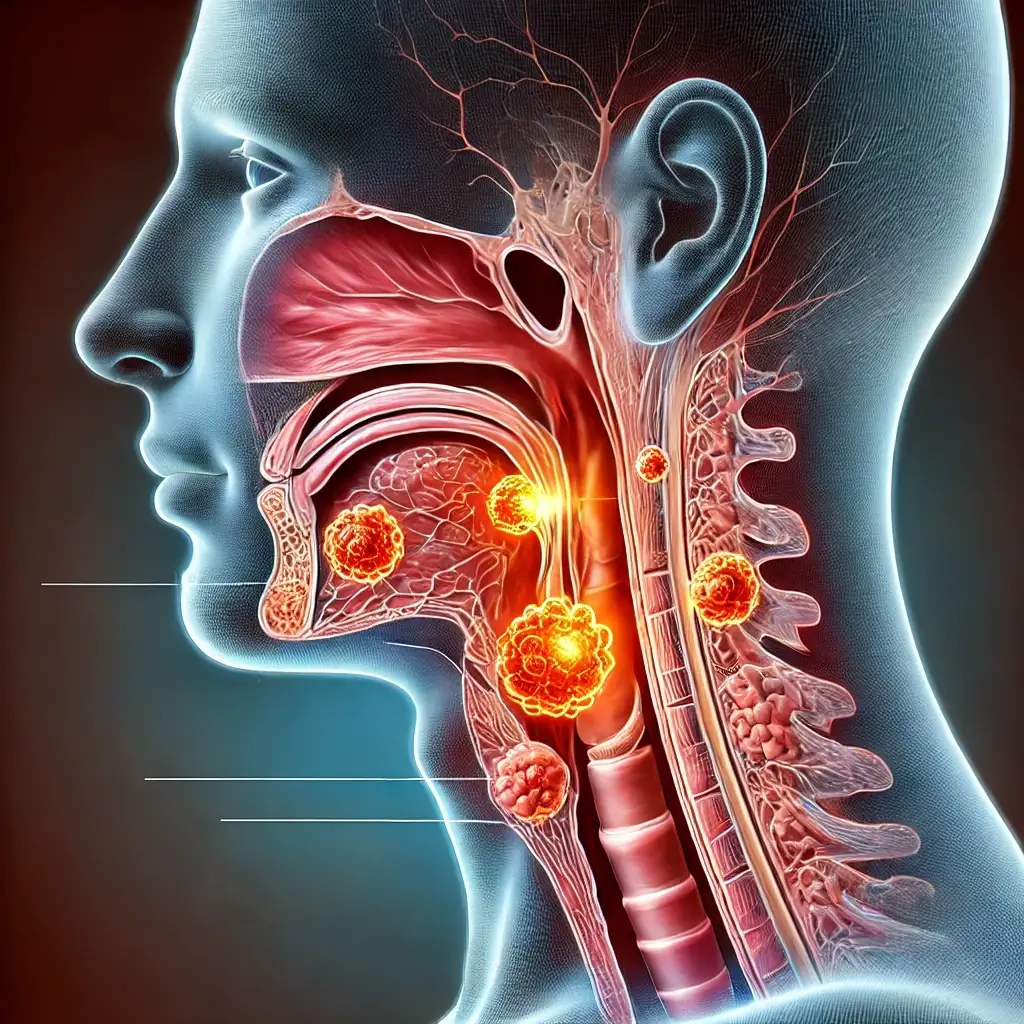Book Appointment Now
Understanding Throat Cancer: Symptoms, Risks, and Treatments

Throat Cancer: Guide
Introduction
What Is Throat Cancer?
Throat cancer, also known as pharyngeal or laryngeal cancer, is a type of cancer that affects the tissues of the throat. This includes the voice box (larynx), the pharynx (throat) or the tonsils. Throat cancer is significant because it can impact essential functions like speaking, swallowing and breathing. It is particularly important to study due to its potential impact on quality of life and the importance of early detection. Recent advancements in treatment, including targeted therapies and immunotherapy, have improved the outlook for patients with throat cancer.
Statistical Overview
Throat cancer is more common in men than in women, and it typically occurs in individuals over the age of 50. Approximately 1 in 25 men and 1 in 50 women will be diagnosed with some form of throat cancer during their lifetime. The five-year survival rate for throat cancer varies significantly depending on the stage at diagnosis. Early-stage throat cancer has a five-year survival rate of 60-80%, whereas advanced-stage cancer has a lower survival rate of around 40-50%.
Medical Illustrations
Single throat cancer cell under a microscope:

The larynx afflicted with throat cancer:

Risk Factors and Prevention
a. Known Risk Factors
The primary risk factors for throat cancer include:
- Smoking and Alcohol Use: Tobacco use and heavy alcohol consumption are the leading risk factors for throat cancer.
- Human Papillomavirus (HPV): Infection with HPV, especially the HPV-16 strain, is linked to an increased risk of throat cancer, particularly in the oropharynx.
- Diet: A diet lacking in fruits and vegetables may increase the risk of throat cancer.
- Family History: A family history of cancer may also increase an individual’s susceptibility.
b. Prevention
To reduce the risk of throat cancer:
- Avoid Smoking and Alcohol: Quitting smoking and reducing alcohol consumption are the most effective preventive measures.
- HPV Vaccination: Vaccination against HPV can significantly lower the risk of throat cancers associated with the virus.
- Healthy Diet: Eating a diet rich in fruits and vegetables supports overall health and reduces the risk of many cancers.
- Regular Medical Check-ups: Regular health screenings can help detect early changes in the throat that might lead to cancer.
Screening Throat Cancer
Screening Methods:
There is currently no standard screening test for throat cancer.
Symptoms and Signs
Common Symptoms:
Throat cancer can present with several symptoms, including:
- Persistent Sore Throat: A sore throat that does not improve over time.
- Hoarseness or Voice Changes: Changes in voice quality, including persistent hoarseness.
- Difficulty Swallowing: Pain or difficulty swallowing food or liquids.
- Lump in the Neck: A noticeable lump or swelling in the neck.
- Unexplained Weight Loss: Unintentional weight loss without an obvious cause.
When to Seek Medical Attention:
- These symptoms are often mistaken for other, less serious conditions like a cold or acid reflux. If any of these symptoms persist for more than two weeks, it is important to consult a healthcare professional.
Diagnosis
Diagnostic Criteria:
There is currently no standard screening test for throat cancer. Diagnosis often begins when a patient presents with symptoms. The diagnostic process may include:
- Physical Examination: A thorough examination of the throat and neck by a healthcare provider.
- Laryngoscopy: Using a laryngoscope to visually inspect the throat.
- Imaging Tests: CT, MRI or PET scans to determine the extent of the cancer.
- Biopsy: Removal of a small tissue sample for laboratory analysis to confirm the presence of cancer cells.
Stages
Types of Treatment
Overview of Treatment Modalities
- Surgery: Surgical removal of the tumor is often used for early-stage cancers.
- Radiation Therapy: Uses high-energy radiation to destroy cancer cells; side effects may include fatigue and skin irritation.
- Chemotherapy: Involves drugs that target cancer cells throughout the body; side effects include nausea, vomiting and hair loss.
- Immunotherapy: Boosts the immune system to attack cancer cells, often with fewer side effects than chemotherapy.
- Targeted Therapy: Drugs that specifically target cancer cells while sparing normal tissue, often used in combination with other treatments.
Comparing Treatments
| Treatment | Mechanism | Side Effects | Efficacy (Survival Rate) | Study/Trial |
|---|---|---|---|---|
| Chemotherapy | Inhibits cell division | Hair loss, nausea | 50% 5-year survival rate | Smith et al., 2022 |
| Immunotherapy | Boosts immune response | Fatigue, rash | 65% 5-year survival rate | Doe et al., 2023 |
Living with Throat Cancer
Managing throat cancer involves addressing both physical and emotional challenges:
- Nutrition: Maintaining a balanced diet is crucial for supporting the body during treatment.
- Exercise: Gentle physical activity, such as walking or yoga, can help reduce fatigue and improve mood.
- Emotional Support: Counseling and support groups can help patients cope with the psychological impact of cancer. Organizations like the American Cancer Society offer resources for support.
Additional Resources
- American Cancer Society
- National Cancer Institute
- Local cancer support groups and helplines
Key Takeaways
- Throat cancer can affect the voice box, pharynx, or tonsils and is more common in men and older adults.
- Major risk factors include smoking, alcohol consumption, and HPV infection.
- Symptoms include hoarseness, persistent sore throat, and difficulty swallowing.
- Treatment options include surgery, radiation, chemotherapy, immunotherapy, and targeted therapies.
- Early diagnosis, healthy lifestyle changes, and emotional support are key to managing throat cancer.
Final Recommendations
- Seek Early Diagnosis: If you experience symptoms like hoarseness or a persistent sore throat, seek medical advice promptly.
- Avoid Tobacco and Alcohol: Quit smoking and reduce alcohol intake to lower your risk of developing throat cancer.
- Get Vaccinated for HPV: HPV vaccination can reduce the risk of HPV-related throat cancers.
- Maintain Regular Check-ups: Regular health screenings are essential for early
Disclaimer
The information provided in this article is intended for general informational purposes only and should not be construed as medical advice. While every effort has been made to ensure the accuracy of the information presented, it is not a substitute for professional medical guidance, diagnosis, or treatment. Always consult a qualified healthcare provider with any questions you may have regarding a medical condition, including Throat Cancer. Do not disregard or delay seeking professional medical advice based on information found in this article. The authors and publishers are not responsible for any consequences resulting from the use of the information provided.
